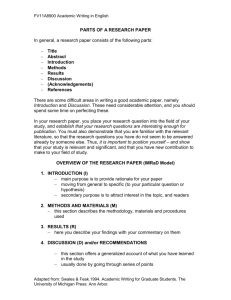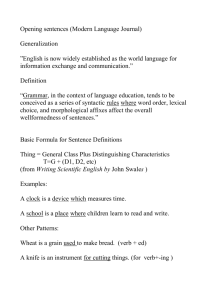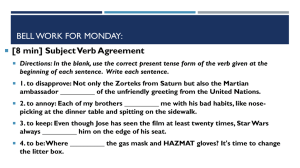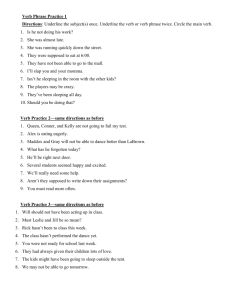the_language_of_academic_papers
advertisement
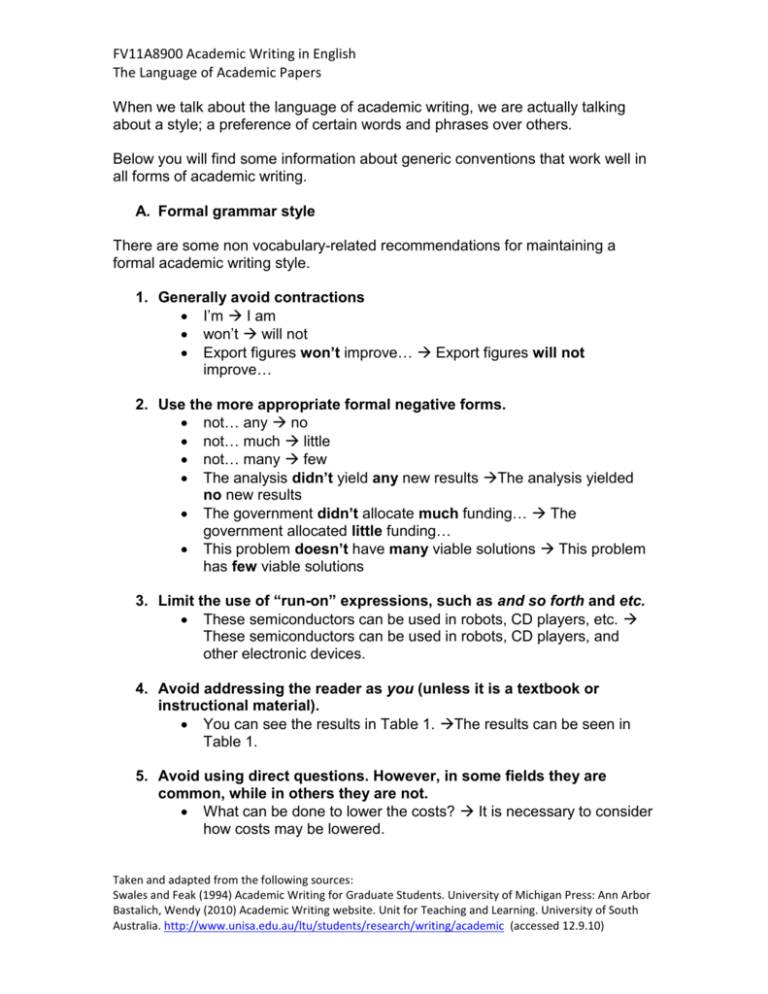
FV11A8900 Academic Writing in English The Language of Academic Papers When we talk about the language of academic writing, we are actually talking about a style; a preference of certain words and phrases over others. Below you will find some information about generic conventions that work well in all forms of academic writing. A. Formal grammar style There are some non vocabulary-related recommendations for maintaining a formal academic writing style. 1. Generally avoid contractions I’m I am won’t will not Export figures won’t improve… Export figures will not improve… 2. Use the more appropriate formal negative forms. not… any no not… much little not… many few The analysis didn’t yield any new results The analysis yielded no new results The government didn’t allocate much funding… The government allocated little funding… This problem doesn’t have many viable solutions This problem has few viable solutions 3. Limit the use of “run-on” expressions, such as and so forth and etc. These semiconductors can be used in robots, CD players, etc. These semiconductors can be used in robots, CD players, and other electronic devices. 4. Avoid addressing the reader as you (unless it is a textbook or instructional material). You can see the results in Table 1. The results can be seen in Table 1. 5. Avoid using direct questions. However, in some fields they are common, while in others they are not. What can be done to lower the costs? It is necessary to consider how costs may be lowered. Taken and adapted from the following sources: Swales and Feak (1994) Academic Writing for Graduate Students. University of Michigan Press: Ann Arbor Bastalich, Wendy (2010) Academic Writing website. Unit for Teaching and Learning. University of South Australia. http://www.unisa.edu.au/ltu/students/research/writing/academic (accessed 12.9.10) FV11A8900 Academic Writing in English The Language of Academic Papers 6. Place adverbs within the verb. In academic writing adverbs are often split, or placed mid-position rather than in the initial or final positions. Actually, very little is known about the species Very little is actually known about species 7. Aim for an efficient use of words. Use as many words as you need to express your point; try to use no more than you really need. It may be difficult to make a decision about the method that we should use. Choosing the proper method may be difficult. 8. The use of I or we Check in several journals to determine what is appropriate in your field. 9. Active and passive voice This section is taken verbatim (that means copied word-for-word) from the Academic Writing webpages of the Teaching and Learning Unit of the University of South Australia. The direct URL can be found from the footer at the bottom of each page. Active voice places the actor of the sentence in the subject − the part of the sentence in front of the verb. For example: ‘management implemented the policy’; or ‘the results confirm an increase in violence’. Passive voice places the actor of the sentence in the predicate (the part of the sentence behind the verb), or leaves it out altogether. For example: ‘the policy was implemented by management’, ‘the policy was implemented’; or ‘an increase in violence is confirmed by the results’, ‘an increase in violence is confirmed’. Preference is for the active voice because it is more direct, concise and accurate. However, there are times when the passive voice makes more sense. Instances where passive voice is deemed more appropriate than active voice may include: 1. for tact and diplomacy (where it would be inappropriate to mention the actor); 2. if the actor is unimportant or unknown; 3. to add variety to the writing; Taken and adapted from the following sources: Swales and Feak (1994) Academic Writing for Graduate Students. University of Michigan Press: Ann Arbor Bastalich, Wendy (2010) Academic Writing website. Unit for Teaching and Learning. University of South Australia. http://www.unisa.edu.au/ltu/students/research/writing/academic (accessed 12.9.10) FV11A8900 Academic Writing in English The Language of Academic Papers 4. in methods and results sections where the action is more important than the actor, for example: ‘stress reactions were monitored in group de-briefing sessions’ rather than ‘I monitored stress reactions in group de-briefing sessions’; 5. to emphasise part of the sentence, for example: ‘a reform agenda emerged from the change of government’ emphasises the agenda, whereas ‘change of government led to a reform agenda’ emphasises the change of government. These guidelines are designed to help you maintain a scholarly an objective tone in your writing. B. The Vocabulary Shift There are increasing challenges in describing academic writing style. However, one distinctive feature is choosing the more formal alternative when selecting a verb, noun or other part of speech. This is called the vocabulary shift and it tends to be one of the more challenging aspects of academic writing. Verbs English often has two (or more) choices to express an action or occurrence. The choice is often between phrasal verbs (verb + particle) or prepositional verb (verb + preposition) and a single verb. In spoken language, the verb + preposition is mostly used, but for written academic style, use a single verb wherever possible. This is one of the most dramatic stylistic shifts from informal to formal style. Compare: According to some biologists, coming up with clear proof of the decreasing numbers of frogs has been difficult. According to some biologists, offering clear proof of the decreasing numbers of frogs has been difficult. Taken and adapted from the following sources: Swales and Feak (1994) Academic Writing for Graduate Students. University of Michigan Press: Ann Arbor Bastalich, Wendy (2010) Academic Writing website. Unit for Teaching and Learning. University of South Australia. http://www.unisa.edu.au/ltu/students/research/writing/academic (accessed 12.9.10) FV11A8900 Academic Writing in English The Language of Academic Papers Task 1 Choose a verb from the box that reduces the informality of the sentence. Note that you may need to add tense to the verb from the list. Write down any other single verbs that you think could also work in the sentences. review maintain develop cause eliminate reach determine investigate decrease constitute 1. The six leading causes of death in the U.S. – coronary heart disease, stroke, lung cancer, colon cancer, diabetes, and chronic obstructive pulmonary disease – are mainly brought on by overeating, a lack of exercise, and cigarette smoking. _____________________ 2. Scientists are looking into innovative ways to combat AIDS. ________________ 3. The purpose of this paper is to try to figure out what is lacking in our current understanding of corrosion and corrosion protection in concrete. ________________ 4. Researchers have recently come up with hybrid vehicles that use a fuelcell engine and a battery-assisted power train. ____________________ 5. Rice and aquatic products make up a major part of the diet of the people in the Mekong Delta, Vietnam. ___________________ 6. The use of touch-screen voting systems could get rid of many problems associated with traditional paper-based ballots. _________________ 7. Worldwide consumption of pesticides has gone up to 2.6 million metric tons. _________________ 8. Although labor unions in the U.S. have been able to keep up their membership numbers over the last two decades, they have been losing their political strength. _________________ 9. the number of mature female green turtles that return to their primary nesting beach has gone down from 1,280 ten years ago to 145 today. __________________ Taken and adapted from the following sources: Swales and Feak (1994) Academic Writing for Graduate Students. University of Michigan Press: Ann Arbor Bastalich, Wendy (2010) Academic Writing website. Unit for Teaching and Learning. University of South Australia. http://www.unisa.edu.au/ltu/students/research/writing/academic (accessed 12.9.10) FV11A8900 Academic Writing in English The Language of Academic Papers 10. The U.S. Defense Threat Reduction Agency looks over nearly 25,000 export license applications to make sure that no equipment or materials are sent to places where they could be used to make advanced weapons. __________________ Task 2 Reduce the informality of the sentences by substituting a single, latinate verb for the one in italics. In each case, try to find two or three possibilities and be prepared to discuss them. 1. Researchers have come up with a number of models to describe the effect of certain beverages on dental enamel erosion. 2. AIDS researchers have run into a variety of unexpected problems in their efforts to develop a vaccine. 3. Recent studies on car scrapping have brought up the important question as to whether CO₂ emissions can be significantly reduced. 4. Problems with this policy showed up soon after its implementation. 5. In the past five years many studies have looked at the effect of different grassland management practices. Nouns and other parts of speech English has a very rich vocabulary derived from many languages (mainly from Latin, French, Old Norse). Because of this, there may be more than one way to express an idea. You should try to choose more formal variants to be more precise. Again, in spoken language you will most likely hear more informal language. Task 3 Which of the two alternatives (in italics) would be more suitable for an academic paper? Can you think of other alternatives? 1. Crash test dummies are really important for/integral part of automotive crash tests. 2. In Hong Kong there is one cell phone for just about/nearly every two people. Taken and adapted from the following sources: Swales and Feak (1994) Academic Writing for Graduate Students. University of Michigan Press: Ann Arbor Bastalich, Wendy (2010) Academic Writing website. Unit for Teaching and Learning. University of South Australia. http://www.unisa.edu.au/ltu/students/research/writing/academic (accessed 12.9.10) FV11A8900 Academic Writing in English The Language of Academic Papers 3. There has been a lot of/considerable interest in how background sounds such as music affect an individual’s ability to concentrate. 4. We got/obtained encouraging results using structural bamboo rather than timber. 5. Consumer interest in electronic billing and payment is getting bigger/increasing. Of course, when you are offered two alternatives, the more academic choice is fairly clear. It is more difficult to make good language choices on your own. Task 4 Look at the following sentences and change the words in italics to a more formal style. You may need to make other changes as well so that the sentence is still grammatical. 1. The competition faced by U.S. growers from imports of Mexican fresh vegetables has gotten more intense. ___________________________________________________________ ___________________________________________________________ 2. Many urban areas do not have enough land to build new public schools. _________________________________________________________ 3. Allergic reactions to local dental anesthesia do not happen very often. ___________________________________________________________ ___________________________________________________________ 4. The doors on these ferries were made bigger to make it easier to load and unload vehicles. ___________________________________________________________ ___________________________________________________________ Task 5 Increase the formality of each sentence. 1. You can use this model to check out the effects of several parameter changes. 2. OK, what are the reasons that coffee prices have fallen? There’re a lot of possibilities. Taken and adapted from the following sources: Swales and Feak (1994) Academic Writing for Graduate Students. University of Michigan Press: Ann Arbor Bastalich, Wendy (2010) Academic Writing website. Unit for Teaching and Learning. University of South Australia. http://www.unisa.edu.au/ltu/students/research/writing/academic (accessed 12.9.10) FV11A8900 Academic Writing in English The Language of Academic Papers 3. You can see the difference between these two ways of designing underground subway stations clearly. 4. Recent research has shown that the arms are used commonly for protection during a fall to the ground. 5. So far there hasn’t been any comprehensive study looking into the role of smiling in getting the initial trust of individuals. 6. There are some studies that have concluded that bamboo could be used by builders more widely that it is now as a construction material. 7. These special tax laws have been enacted in six states: Illinois, Iowa, Ohio, etc. 8. There isn’t very much research on the use of oil palm shell as coarse aggregate in the production of concrete. NOW…Task 6 a) Read through a page of your reference article and look for the things mentioned in the article above. Are there specific words and/or that are repeated? Are there any new expressions? b) If you bought the recommended textbook for the course, then take a look at section 3.2 Academic vocabulary (pp179-183). There you can find more examples of formal nouns, verbs and adjectives. If you don’t have the book (or even if you did have the book), take a look at the following websites: Academic Writing in English http://sana.tkk.fi/awe/style/vocabulary/index.html Here, you can work on academic (formal) vocabulary http://sana.tkk.fi/awe/style/sentence/index.html This part of the website gives you more detailed information on what you read above. It also has exercises you can try at the end if you wish. Taken and adapted from the following sources: Swales and Feak (1994) Academic Writing for Graduate Students. University of Michigan Press: Ann Arbor Bastalich, Wendy (2010) Academic Writing website. Unit for Teaching and Learning. University of South Australia. http://www.unisa.edu.au/ltu/students/research/writing/academic (accessed 12.9.10) FV11A8900 Academic Writing in English The Language of Academic Papers Homework: 1) Vocabulary Shift review: a. Go to the following URL: http://sana.tkk.fi/awe/style/vocabulary/exercises/index.html b. Choose one exercise per section (minimum) – the estimated time for each exercise can be found at the right. VERBS Finding unsuitable informal verbs 15 min. Recognising formal verbs 5 min. Selecting the most formal verb 20 min. ADJECTIVES Recognising formal adjectives 5 min. Selecting the most formal adjective 10 min. ADVERBS Recognising formal adverbs 2) Forming the passive (optional) If you’ve forgotten how to form the passive, go through the explanations at the following website: http://sana.tkk.fi/awe/grammar/passive/index.html Taken and adapted from the following sources: Swales and Feak (1994) Academic Writing for Graduate Students. University of Michigan Press: Ann Arbor Bastalich, Wendy (2010) Academic Writing website. Unit for Teaching and Learning. University of South Australia. http://www.unisa.edu.au/ltu/students/research/writing/academic (accessed 12.9.10) 15 min.
